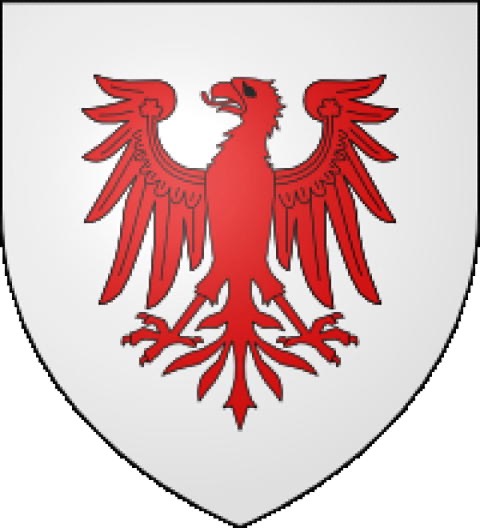ArcOfHistory

Shield of Ansbert Ansbertus Gallo De BRANDEBOURG,
supposedly my forty-fourth great-grandfather (circa 510)
If you struggle to follow my descriptions of my Fambly history, you're in decent company because I struggle, too. I cannot determine if the more ancient history amounts to truth or fantasy. Even the experts give mixed reviews. I have apparently been reporting the more popular history, the one that the experts find most suspicious. Early Frankish kings reportedly published lavish histories to legitimize their rule. Their ruse, if it was a ruse, largely succeeded in at least creating a ruling myth that convinced most that they were authentic, whether or not they were. I hold questions about how Romans managed to pivot into prominence within both the Carolingian and Merovingian dynasties, both precursors to more modern French and English rulers. The short answer should seem obvious enough. They succeeded by strategic marriages. Wed the daughter of a king, and you became the doted upon son-in-law, and certain avenues open that would have otherwise been closed. If my Fambly history was ever more than mythology, my forebears slept their way to the top, the most old-fashioned of the many old-fashioned ways.
And the top they did achieve. Even if they were never more than trumped-up history, at least they inhabited a fascinating story. The standard notion that Goths overran Rome grossly oversimplified what actually happened. A lengthy period of contested borders lasted for decades, and survival depended on more than continual war. Borders were established before being challenged, and with each generation, lands would be subdivided again if only to provide inheritances for a king's sons. Clever politicians could and did surf the turmoil. It's no accident that what would become European rule would closely resemble the structure of Roman governance. Early Christianity borrowed much from the pagan past. If it hadn't, it would have been lost when adopted by the pagan people. It was used as a premise for conquest, perhaps more than as a means to save anyone's soul.
"The Carolingian dynasty...appropriated the Roman past into its ancestry by a genealogy that claimed that its sainted (and historically attested) founder, Arnulf of Metz (d.c. 643) was the grandson of the (mythical) Merovingian princess Blithild and her (equally mythical) husband Ansbert, hailed as a Roman senator." ["Europe after Rome: a new cultural history 500-1000", by Julia M H Smith, Oxford University Press 2005]
Wikipedia claims that Ansbertus or Ansbert, Ausbert was a Frankish Austrasian noble, as well as a Gallo-Roman Senator. He is thought to be the son of Ferreolus, Senator of Narbonne, and his wife, Saint Dode. This would perhaps make him the great-grandson of Sigimerus (son of Clodius) and his wife, a daughter of Ferreolus Tonantius (a Roman Senator and Praetorian Prefect of Gaul). His wife Billihild was reputed to be a daughter of Charibert I, Merovingian King of Paris, and granddaughter of Chlothar I.
Little of his actual life is known. Published centuries later, the Liber Historiae Francorum states that an Ansbertus married Blithilde (also called Bilichilde) and that she was the daughter of "Lothar the father of Dagobert” and then continues the line to the Pippinids through his son Arnoald and his granddaughter Itta (wife of Pepin of Landen).
I found one source that purports to trace Charlemagne's genealogy back to Abraham and, from there, to Adam. If this record were accurate, I would have proof that I was directly related to you. This record could not possibly be correct as it relies upon twenty generations where everyone lived for hundreds of years, several for almost a thousand. Call me one of the many Ye Of Little Faith, but I wasn't born yesterday or even the day before. I remain interested in the ArcOfHistory, how somebody—why not my own mythical lineage?—managed to survive tectonic transitions from antiquity into reasonably well-known history. It might be impossible to draw undisputed lines between antiquity and today, but the ArcOfHistory seems to prove true either way. Not all was lost when Rome fell. Not all ways were rediscovered after the hoards became more civilized. History seems brutal, no matter what track the story follows. It seems like a miracle that any of us are here, and that goes double for my more mythical ancestors. Out of myth, all of this emerged.
©2024 by David A. Schmaltz - all rights reserved


